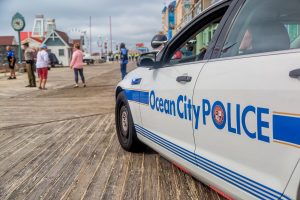
OCEAN CITY — A high-speed chase in the resort last month that resulted in a collision with an Ocean City Police Department (OCPD) vehicle raised eyebrows for some in the community about the use of License Plate Reader (LPRs) technology to identify suspects, but the city has assured the public the system is not used for nefarious purposes.
In mid-November, an LPR on eastbound Route 90 alerted on a wanted individual entering Ocean City. A traffic stop was initiated, resulting in a high-speed chase that culminated with the suspect crashing into a marked OCPD vehicle and injuring an officer. As it turned out, the driver was wanted in a lengthy DEA case involving drugs and weapons and he was subsequently arrested and charged.
Despite the good outcome in that case, some in the community questioned the use of LPRs at each of the entrances to Ocean City and their potential misuse, implying the OCPD and presumably other law enforcement agencies were using the plate-reading technology for less than above-board purposes, evoking big brother implications.
As it turns out, the LPRs do track every vehicle and tag number entering the resort, but that information is highly protected and utilized by law enforcement in only special circumstances under strict guidelines.
OCPD Communications Director Lindsay Richard explained some of the uses for the LPRs and how the information is stored and utilized on rare occasions such as last month’s high-speed chase and collision that resulted in the apprehension of a wanted suspect in a federal case.
“The license plate readers are designed to assist in the prevention of crime, investigating crime and locating wanted and missing individuals,” she said. “The LPRs read every tag that passes it. That information is stored with the Maryland Coordination and Analysis Center (MCAC) and held for a specified period of time. The OCPD can only access that information under very strict guidelines.”
Richard explained the OCPD cannot simply peruse the lists of vehicles and tags entering and exiting the resort without a specified purpose.
“If officers wish to use the LPR as a tool in their investigation to find out if a vehicle passed an LPR, they must request to access it through MCAC,” she said. “They are required to have a case number and provide very specific documentation as to why they need to information from a particular LPR. They must also be looking for a specific vehicle and can’t simply browse the tags or names of people that have passed an LPR.”
Richard explained the OCPD only utilizes the LPR technology in specific cases where its use can aid in a serious investigation.
“An example of this was the fatal hit-and-run bike collision in the summer of 2017 that killed a J-1 student,” she said. “Officers had a partial tag and a description of the vehicle. A request was made to the MCAC and officers were able to find a suspect who was ultimately found guilty and sentenced to 10 years in prison.”
According to Richard, the LPRs can be used for a variety of other purposes not always crime-related.
“The LPRs also alert of vehicles that pass through that are associated with a variety of things such as wanted persons, Amber alerts, missing people or stolen cars or tags,” she said. “Those alerts are submitted by law enforcement agencies through MCAC and there must be specific documentation provided explaining why an alert should be put on a particular vehicle. We have only requested information a handful of times each year because our standards for searching are so high.”
Ricard cited another example when an LPR was utilized to locate a missing person under emotional distress.
“Another example was a missing woman,” she said. “An alert was placed on a vehicle registered to a missing endangered person out of Pennsylvania. The vehicle passed through the Route 50 LPR and officers soon located her at 2nd Street and the beach. Our officers got her set up with the help she needed and put her in contact with her family.”

